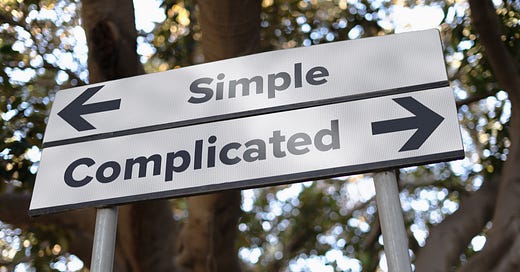It's Complicated
A survey conducted in Ohio shows a three-fold increase to 2.8% in the rate of problem gambling among adults, with 10.4% of online gamblers falling into the PG category.
The Bulletin Board
NEWS: Ohio’s once-every-five-year gambling survey indicates a three-fold increase in the problem gambling rate.
BEYOND the HEADLINE: The limitations of the current tool used to identify at-risk and problem gamblers.
NEWS: New York Senator to introduce online casino legislation before January. The question is, can it pass?
BEYOND the HEADLINE: I’d expect a clean online casino bill if New York had the votes.
NEWS: Citing a busy schedule, Gov. Ron DeSantis asks the Florida Supreme Court for extra time to file its response.
AROUND the WATERCOOLER: Imitation is the best form of flattery.
STRAY THOUGHTS: What to expect (and plan for) as we head into 2024.
SPONSOR’S MESSAGE - Underdog: the most innovative company in sports gaming.
At Underdog we use our own tech stack to create the industry’s most popular games, designing products specifically for the American sports fan.
Join us as we build the future of sports gaming.
Visit: https://underdogfantasy.com/careers
Ohio Survey: 3x Increase in Problem Gambling Rate
The 2022 Ohio Gambling Survey was discussed during a recent Ohio Casino Control Commission meeting. The study’s results (which is done every five years) were alarming.
The problem gambling rate ballooned from .9% in 2017 to 2.8% in 2022. The PG rate in 2012 was .5%. It’s important to note that the 2012 and 2017 results are below the national average, which is routinely in the 1-3% range. I’m curious if the scale measuring problem gambling rates changed between 2017 and 2022.
Per the 2022 study (which is not publicly available), online gamblers were the most at-risk, with more than half at-risk and 10.4% falling into the problem gambling category, based on the Problem Gambling Severity Index (PGI or PGSI).
The PGSI defines risk as follows:
Low Risk = 1-2 on the PGI
Medium Risk = 3-7 on the PGI
Problem Gambler = 8+ on the PGI
This is important, as online sports betting launched on January 1, 2023, after the survey had concluded.
Beyond the Headline: The Limitations of the PGSI
So, what is the PGSI? It’s a self-assessment tool that measures a person’s likelihood of having or developing a gambling disorder.
The nine questions have four possible answers, with 0, 1, 2, or 3-point scores. After answering each question, you tally your score to assess your risk. Someone could conceivably score a 27, but any score of 10+ would be highly concerning.
The PGI puts the problem gambling threshold at 8, but there are numerous ways to get to an 8, 9, or even a 10, and not have a problem. Someone who is self-critical and has an overly concerned family member would probably be starting at a 5 or 6.
Landing in the low end of the medium risk category isn’t too hard if you gamble with any regularity. And because of the questions, certain forms of gambling tend to score higher. Sports betting will likely cause more stress/anxiety than slots, and poker players routinely borrow money and increase stakes.
Similarly, younger and/or lower-income bettors will also score high, given the financial nature of many of the questions. A 22-year-old gambling $50 on sports every weekend will feel the sting of losses, but in the grand scheme, the loss is only $5-$10 per week.
Given these variables, I would redefine the categories as follows:
Low Risk: Someone who gambles infrequently or gambles frequently but conservatively.
Medium Risk: Someone who gambles regularly or gambles infrequently but more irresponsibly.
Problem Gambler: Someone who exhibits signs of a gambling disorder.
This is where context matters. As I recently wrote:
“The bad ideas stem from one of the big misconceptions in the space, that a questionnaire or a specific assortment of betting behaviors can spot gambling disorders. Those things are certainly helpful, but it’s way more complicated than that.”
I’m not against these surveys, nor feel they can’t provide valuable data and insight. Instead, I’m concerned about how they are used and cited and often perplexed by the sweeping conclusions drawn from them.
Sponsorship opportunity
Want to sponsor the fastest-growing newsletter in the gambling space? Straight to the Point has multiple sponsorship opportunities available.
Reach out to Steve at iGamingPundit.com for more details.
New York iCasino Push Is Starting Early
New York State Sen Joseph Addabbo Jr. plans to pre-file online casino legislation sometime before January, per reporting by Sports Betting Dime’s Robert Linehan.
The bill is intended to spark conversations during the state’s annual budget discussions.
“We know we need revenue in New York. Here we are, we’re on the cusp of an iGaming and iLottery bill, and all I need is the Governor in her budget to merely say seven words or so. ‘We’ll look and explore the possibilities of iGaming and iLottery.’ No other details,” Addabbo Jr. told SBD.
Per SBD, “The bill will seek to legalize online casino games, such as slots and table games, and allow New Yorkers to play lottery games like Powerball from a phone or computer.”
The online lottery component is an intriguing addition (New York already offers online subscriptions) as it might court some support from lottery supporters.
Another interesting possibility, reported by Play USA’s Matt Kredell, is the addition of a “$25 million fund for brick-and-mortar casino workers in gaming legislation next year.”
According to Kredell, who spoke with Sen. Addabbo, “The money is meant to appease the New York Hotel & Gaming Trades Council, which lobbied heavily against online casino last year citing cannibalization concerns for resort casino workers.”
Beyond the Headline: One Step Forward and Two Back
The lottery and union additions add another layer to an already multi-layered situation in New York.
In addition to online casino legalization, there are calls to alter the current mobile sports betting tax structure (either arbitrarily lowering it or adding more licenses), the licensing of down-state resort casinos, and ongoing tensions between the state and the Seneca Tribe.
It also signals that online casino doesn’t have enough support to pass, and the lottery and union components start to look like Hail Mary attempts to bring in more supporters.
As I wrote about North Carolina earlier this year:
“North Carolina is traveling down the “keep adding things until the measure dies” route…
The kitchen sink approach is a common occurrence in states struggling to gain enough support for a gambling expansion. The theory is you can add another expansion that opponents of your effort agree with to bring them on board… So you gain a few votes and lose a few votes. And then, in a desperation hail-mary attempt, you try adding another expansion (and maybe another), and the same scenario plays out. You keep adding and adding until no one supports it.”
And, as Chris Grove wrote on X, “I would be thrilled professionally if NY passed online casino. But I think we have not even begun to see the opposition that will emerge if online casino is seriously in play.”
Sponsor’s Message - Jackpocket, America’s #1 lottery app, is proud to partner with Spectrum Gaming Group to release “The Future of Lottery Courier Services,” a report outlining consensus-driven best practices for the industry. Implementing these common-sense measures will help ensure transparency, accountability, and consumer protection, while continuing to sustainably grow the US lottery market without compromising its integrity.
Read the report here: https://blog.jackpocket.com/spectrum-gaming-report-on-the-future-of-lottery-courier-services/
Gov. DeSantis Requests Extension from FL Supreme Court
The Florida sports betting case is making (slow but steady) progress at the federal level. That’s not the case on the state level, where things have temporarily stalled following a request from the Florida Attorney General for a 30-day extension to respond to the West Flagler case.
West Flagler filed an opposition to the extension. As attorney Daniel Wallach noted, West Flagler’s best argument is that no one knows if or when the Seminole Tribe will relaunch its sports betting app.
Despite West Flagler’s protest, the request was granted on Friday, giving Gov. DeSantis until December 1 to file his response.
With the US Supreme Court case chugging along, there’s no rush to conclude the Florida Supreme Court case, as the Seminole Tribe appears content to wait until both cases are resolved before relaunching their Hard Rock Bet sports betting app.
To be continued…
Around the Watercooler
Social media conversations, rumors, and gossip.
The inspiration for ESPN Bet’s new logo was questioned by BroThrow, a social sports betting app, in a post that was strangely deleted by LinkedIn (but is still up on X):
And here are the two logos side by side.
BroThrow co-founder Brady Sharp has been trying to reach out to ESPN Bet to connect.
Sharp spoke to Earnings+More, saying the company is “strategizing with our IP counsel… But we all agree a conversation is the best starting point.”
Stray Thoughts
“Expect the best, plan for the worst, and prepare to be surprised.” ~ Denis Waitley
These are words to live by as we prepare for the 2024 legislative session.
Sports betting is doing its best traveling salesman impression and knocking on the door in several key states. Some states like Georgia and Missouri invite sports betting in for a conversation before denying them their commission. Other states like Texas and California yell through the door to go away.
And then there is online gambling, which is slowly picking off states at a rate of about one per year. At some point, that is expected to change. The floodgates will open. But like last year and the year before, the quote above is the most likely outcome for 2024.
Also, predictions are a big theme this week.








